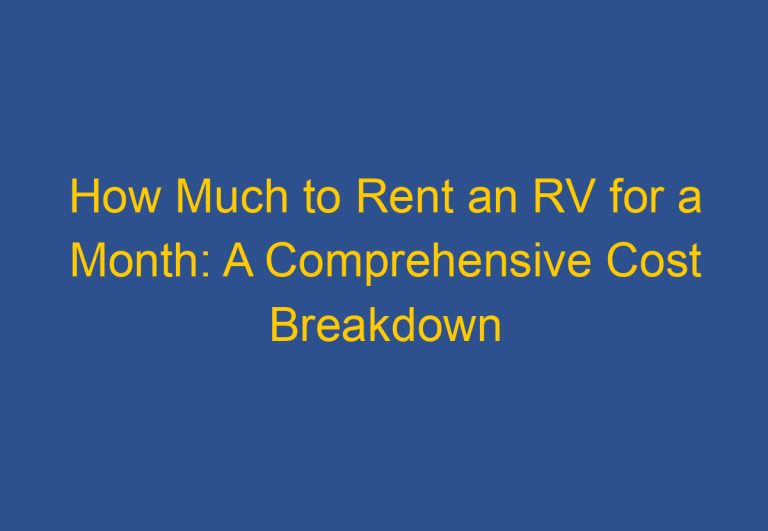What is the Age Limit on Moving a Mobile Home? Explained
Moving a mobile home can be a daunting task, especially when it comes to navigating the various regulations and restrictions that come with it. One of the most important considerations is the age limit on moving a mobile home. This refers to the maximum age of a mobile home that can be moved from one location to another. While there is no universal age limit that applies to all states and counties, there are some general rules that can help you determine whether your mobile home is eligible for relocation.
Generally, most states and counties have some form of age limit on moving a mobile home. For example, some states may require that the mobile home be less than 20 years old, while others may have no age limit at all. Additionally, some counties may have their own rules and regulations regarding the age limit on moving a mobile home. It is important to research the specific regulations in your area before attempting to move your mobile home. Safety is also a critical consideration when moving a mobile home, as older homes may be more susceptible to damage during transportation.
Understanding Age Limits and Regulations for Mobile Home Relocation
Moving a mobile home can be a daunting task, especially when it comes to navigating the various legal requirements and regulations surrounding age limits, permits, and zoning laws. In this section, we’ll explore some of the key considerations involved in relocating a mobile home, including assessing its structural integrity and safety, navigating local laws, and securing the necessary permits and documentation.
Assessing the Structural Integrity and Safety of Older Mobile Homes
One of the most important considerations when relocating a mobile home is ensuring that it is structurally sound and safe to move. This is particularly important for older mobile homes, which may have deteriorated over time and may not meet current safety standards.
To assess the structural integrity and safety of an older mobile home, it’s important to conduct a thorough inspection. This may involve checking the home’s foundation, roof, walls, and electrical and plumbing systems, as well as ensuring that it meets current safety and building codes.
Navigating Legal Requirements and Local Laws
In addition to assessing the safety and structural integrity of a mobile home, it’s also important to navigate the various legal requirements and local laws surrounding mobile home relocation. This may include obtaining a moving permit, securing a certificate of title or VIN, and complying with local zoning and building codes.
To ensure compliance with these requirements, it’s important to research and understand the specific laws and regulations in your area. This may involve consulting with local officials or hiring a professional to assist with the relocation process.
Securing Permits and Handling Documentation
Finally, when relocating a mobile home, it’s important to secure the necessary permits and handle all required documentation. This may involve obtaining a building permit, submitting a moving application, and providing proof of insurance and other documentation.
To ensure a smooth and successful relocation, it’s important to carefully review all required permits and documentation, and to work closely with local officials and professionals to ensure compliance with all relevant laws and regulations.
Overall, relocating a mobile home can be a complex and challenging process, but with careful planning and attention to detail, it is possible to navigate the various legal requirements and regulations involved and ensure a safe and successful move.
Logistics and Costs of Moving a Mobile Home
Moving a mobile home can be a complex and daunting task. There are many factors to consider, including logistics and costs. In this section, we will explore the key aspects of moving a mobile home and provide helpful information to make the process smoother.
Choosing the Right Mobile Home Mover
When it comes to moving a mobile home, it is crucial to choose the right mover. A licensed, bonded, and insured professional moving company is the best choice for the job. They have the necessary experience, equipment, and insurance to ensure a safe and successful move.
It is also important to choose a mover who specializes in moving manufactured homes. These professionals have the expertise to handle the unique challenges of moving a mobile home, such as navigating narrow roads and tight spaces.
Estimating the Financial Implications
The cost of moving a mobile home can vary widely depending on several factors. Some of the costs to consider include labor costs, insurance, taxes, equipment, utilities, upgrades, and more.
According to recent data, the average cost to move a mobile home is between $6,500 and $11,500, depending on the size of the home and the distance of the move. However, long-distance moves can cost up to $25,000 or more.
To get an accurate estimate of the cost of moving your mobile home, it is best to get quotes from several professional mobile home movers. Be sure to ask about any additional costs or fees, such as permits or inspections.
Preparing for the Move
To ensure a successful move, it is important to prepare your mobile home properly. This includes removing any skirting or awnings, disconnecting utilities, and securing loose items inside the home.
It is also important to ensure that your mobile home is up to code and meets all local and state regulations. This may require upgrades or repairs, which can add to the overall cost of the move.
In addition, it is important to make sure that your homeowner’s insurance will cover any damages that may occur during the move. You may need to purchase additional insurance or riders to ensure adequate coverage.
In summary, moving a mobile home can be a complex and costly process. However, by choosing the right mover, estimating the financial implications, and preparing properly, you can ensure a safe and successful move.
Frequently Asked Questions
What are the regulations for relocating an older mobile home?
The regulations for relocating an older mobile home vary by state and county. Some states have age limits for mobile homes, while others require an inspection for structural integrity and safety. It is important to research and understand the local regulations before attempting to move an older mobile home.
How does the year of manufacture affect mobile home relocation eligibility?
The year of manufacture can affect mobile home relocation eligibility in some states. For example, in Florida, mobile homes that are 20 years or older may not be eligible for relocation. However, some counties may have their own rules and regulations regarding the age of mobile homes.
Are there specific state guidelines for moving older mobile homes in North Carolina?
Yes, there are specific state guidelines for moving older mobile homes in North Carolina. Mobile homes that are more than 20 years old must meet certain requirements before they can be moved. These requirements include an inspection for structural integrity and safety.
What is the maximum age of a mobile home for legal transportation?
The maximum age of a mobile home for legal transportation varies by state and county. Some states have age limits for mobile homes, while others require an inspection for structural integrity and safety. It is important to research and understand the local regulations before attempting to move an older mobile home.
Which authorities issue permits for mobile home relocation?
The authorities that issue permits for mobile home relocation vary by state and county. In some cases, the state department of transportation may issue permits, while in other cases, it may be the county or city government. It is important to research and understand the local regulations before attempting to move a mobile home.
How do state laws in Illinois and Georgia differ regarding mobile home moves?
State laws in Illinois and Georgia differ regarding mobile home moves. In Illinois, mobile homes that are more than 25 years old must meet certain requirements before they can be moved. In Georgia, mobile homes that are more than 20 years old must meet certain requirements before they can be moved. It is important to research and understand the local regulations before attempting to move an older mobile home in either state.










